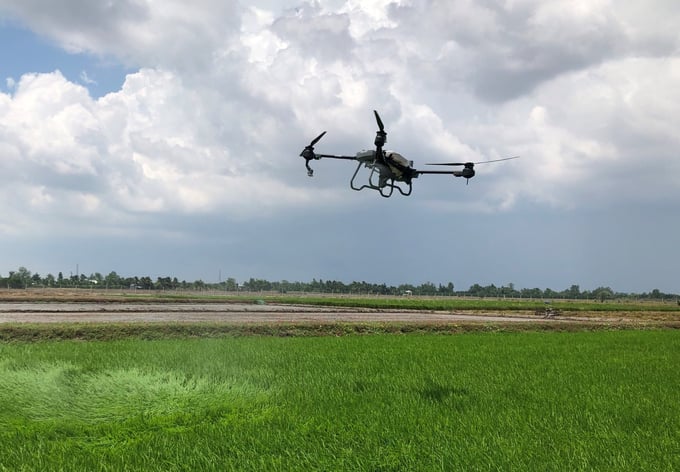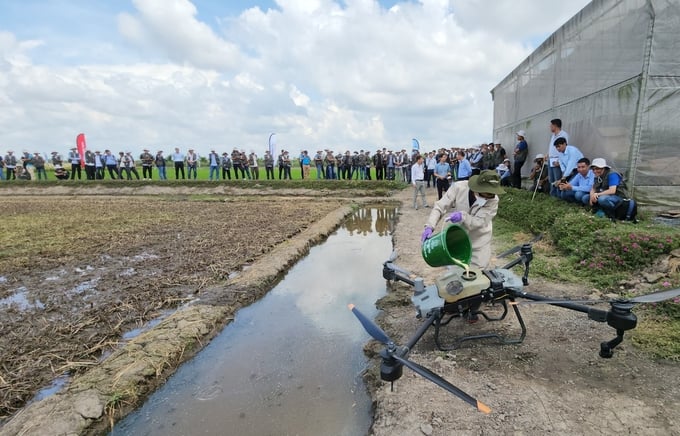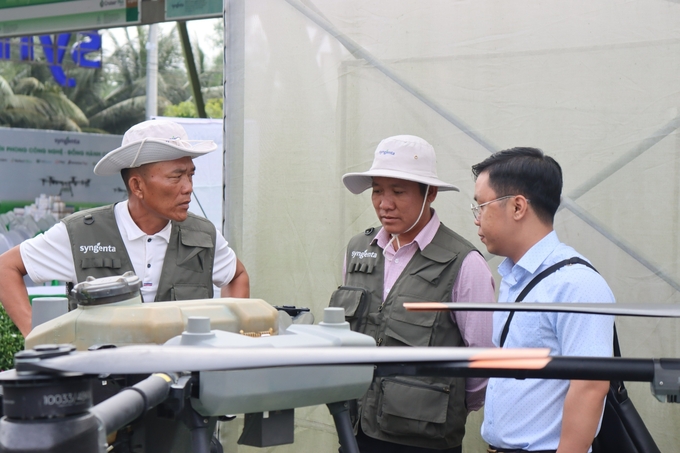May 19, 2025 | 23:19 GMT +7
May 19, 2025 | 23:19 GMT +7
Hotline: 0913.378.918
May 19, 2025 | 23:19 GMT +7
Hotline: 0913.378.918
Rigorously applying and operating drones in farming activities is extremely necessary, enabling Vietnamese agriculture to keep pace with technological advances in the world.
Although agriculture plays a crucial role in Vietnam’s economy, it nevertheless faces challenges, especially labor shortage due to rapid urbanization. Research on the migration of rural workers to urban areas conducted by the United Nations in 2022 shows that Vietnam’s urban population accounts for 44% and will increase to over 50% in the next 5-10 years. Therefore, traditional farming methods, which require a lot of manpower in the field, will face increasing, inevitable obstacles.

Drones’ potential in agriculture is being recognized globally and locally.
Furthermore, costs for agricultural production in Vietnam – particularly key crops such as maize, rice, and soybean – are much higher than in other countries and developed countries. This financial gap stems from mechanization, automation, and digitalization in agricultural production.
And yet, as climate change is becoming intense, the application of new technology to agriculture enables development. Farmers are witnessing the gradual depletion of natural resources, increasing pest pressure, and health and safety concerns. Therefore, new technology, especially drones, will solve some challenges in agriculture and contribute to the ecosystem.
Agricultural drone use is a growing trend in many Asian countries such as Japan, Korea, India, and especially China (data shows that in China 2021, around 160,000 drones supply a total estimated area of nearly 87 million hectares). Agricultural drones also receive great attention from local authorities, businesses, and Vietnamese farmers.
Earlier this year, the Plant Protection Department (Ministry of Agriculture and Rural Development) announced the first field standard for pest control using drones.

Agricultural drone use for spraying pesticides can increase productivity by 15-30 times and shorten the spraying time per unit area.
Outstanding performance
Many experimental models of spraying pesticides by drones prove the immense potential for applying this technology in agriculture. The drone is programmed according to a predetermined flight route with stable speed, guaranteeing a level of accuracy when spraying pesticides. In doing so, drone users can avoid problems such as overlapping, repetitive, or scattered spraying.
Farmers often have to spray many times during the growth cycle, investing a lot in labor costs, which gives farmers a real headache. Drone application, on the other hand, allows efficiency without much manpower, increasing productivity by 15-30 times and shortening the spraying time per unit area.
Regarding safety measurements, spraying pesticides by drones also helps farmers limit their exposure to pesticides, thereby protecting farmers’ health. Additionally, the amount of water used for drones usually only accounts for 5-10% of the amount of water used for traditional methods, helping to save water and protect the environment.
Understanding agricultural drone technology and operation
Agricultural drone application and operation in spraying pesticides, despite many advantages, are still limited because of the lack of specific instructions on safety and efficiency.
Farmers who apply drones in agriculture are still confused due to the lack of information, as well as the know-how to operate drones correctly and meet standards in agricultural farming.

A technical team from Syngenta Vietnam instructs drone operators.
In response to this lack, a leading enterprise in agriculture, Syngenta Vietnam Co., Ltd. organized an event titled “Technology Pioneer – Agricultural Drone” to train operators on how to apply drones in farming. The technical team from Syngenta, with all their experience, guides the operators to better control and understand the procedures of drones. The event ensures that drone operators can improve pesticide spraying technology with safety, efficiency, and correctness.
Mr. Nguyen Vu Lam from Thanh Tay hamlet, Thanh Dong commune, Tan Hiep district (Kien Giang) excitedly reports after the training session: “In the age of technology, Vietnam’s agriculture needs to apply new farming methods. By spraying pesticides using drones, operators like us will be the first to benefit.
Syngenta Vietnam is not only the leader, but I observe that they are also trying to create a foundation and apply global scientific advances to Vietnamese agriculture. Not only do they help farmers to solve current issues, but also create new jobs such as drone operators for me and my brothers here.”
Mr. Nguyen Thanh Tuan, Head of Business Sustainability (Syngenta Vietnam Co., Ltd.) states: “Using drones to support farming is gaining farmers’ interest. We hope that training sessions like these will provide practical, timely, and complete information so that the agricultural industry can confidently access more effective and new technologies, ensuring Vietnam’s sustainable agriculture development.”
Translated by Quynh Chi
![Reducing emissions from rice fields: [Part 1] Farming clean rice together](https://t.ex-cdn.com/nongnghiepmoitruong.vn/608w/files/news/2025/05/05/z6509661417740_a647202949c539012a959e841c03e1d3-nongnghiep-143611.jpg)
(VAN) Growing clean rice helps reduce environmental pollution while increasing income, allowing farmers to feel secure in production and remain committed to their fields for the long term.
/2025/05/19/5136-1-144800_230.jpg)
(VAN) The Nghe An Provincial People's Committee has just approved the list of beneficiaries eligible for revenue from the Emission Reductions Payment Agreement (ERPA) in the North Central region for the year 2025.

(VAN) 14 out of 35 domesticated elephants in Dak Lak province have had their living conditions improved, with 11 of them currently participating in the non-riding elephant tourism model.

(VAN) Muong Nhe Nature Reserve hopes that being upgraded to a national park will lay the foundation for forest protection efforts to be carried out in a systematic, modern, and sustainable manner.
/2025/05/16/3923-2-171845_52.jpg)
(VAN) Lower costs, higher yields, and improved soil quality are outstanding benefits that soybeans bring when integrated into the crop rotation system.

(VAN) The 'For a Green National Environment' programme aims to promote a green lifestyle, support businesses in implementing ESG practices, and turn Net Zero commitments into concrete actions.

(VAN) Cold-barn systems efficiently manage environmental and temperature conditions, which aids in the prevention of respiratory diseases in pigs and protects them from the vectors that transmit African swine fevers.